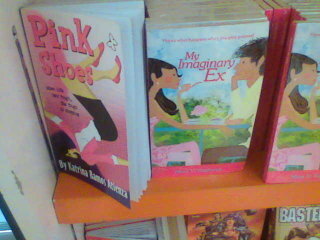On year 15 I say: go indie, stay non-exclusive



2024 is my 15th (!) year of being a published author. My first book My Imaginary Ex, my author name “Mina V. Esguerra,” and my author blog debuted in 2009. I’ve since written 27 more standalone books, a dozen or so short stories, participated in different publishing projects, did traditional publishing and self-publishing. Been in countless meetings with publishing teams, retailer teams, reviewed and participated in publishing offers and collabs from trad pubs, digital pubs, book apps, retailers. All of my books remain available, copyright mine, and many are in various stages of development either as new editions or new forms and new media.
I have this freedom and my older books remain relevant because I self-publish.
Filipino Authors, if you ever need my opinion on publishing anything, here’s the 2024 version: Self-publish everything first. Stay non-exclusive.



If you want a longer story lol:
If you’ve been reading my blog long enough, like say since 2009 when I started documenting my publishing journey, you’d have seen me go back and forth between recommending being indie, traditionally published, and hybrid which is a combination of both. Since I started self-publishing all of my books and then partnering with corporate later for wider distribution (which is what makes someone a hybrid author), I’ve seen several cycles of corporations courting authors for publishing projects, and then letting the authors down or dropping the project all together. It’s predictable.
A quick recap of my publishing history: Started as traditionally published in the Philippines with Summit Books, then self-published on Amazon, then hybrid via Summit Books, trad on digital via Flirt Publishing, hybrid via Anvil, completely indie when my 5 years with Anvil were up. In between I did various projects for apps/retailer sites like SmartEbook, buqo, Rising Tide, TypeKita. This year I’ll go hybrid again with Komiket.



I can do this because I own all rights to every story I’ve written. And I’ve said no or negotiated when contracts with corporate entities asked for all rights. (Copyright is different from all the other rights publishers ask for when offering to publish your story.) This is how my books remain available to purchase. My first book turns 15 years old next month and it’s still being read and purchased today.
Many authors who sign on to work exclusively with a publisher at the beginning of their career will not even have the freedom to go hybrid over and over like I do because they started out with selling their intellectual property (our books/manuscripts are our IP) to a corporation that will own it or make it hard for them to get it back. I used to think there are situations when this is okay, or offers that could make it okay, for authors to sign exclusive contracts and sell their IP. Seeing how fiction websites/apps and even writing programs reveal again and again how quickly they’d sell our IP to a bigger corporation or to feed into AI — I’m done.
I said: Self-publish everything first. Stay non-exclusive.
What does this mean? A lot of things, but some examples:
Your digital edition should be available in more than one store/retailer. Amazon, sure. But also the sites that accept more Pinoy-friendly payment options. (Related: Your audio edition should be in more than one store/retailer.)
Your print edition should start as print-on-demand. Most of us who self-publish are watching our costs and making budgets. When your book is print-on-demand, you don’t spend for printing until you know for sure there’s a demand (and payment). Printers are suppliers. Work with several printers at the same time even. I have a printer in the Philippines and a network of printers worldwide. This has ensured that my print book can be purchased any time in all of those countries covered. And if for any reason my usual printer can’t supply the order I need, I’m free to work with someone who can. Because printers are suppliers.
Your corporate partnerships, like with publishers or film producers, should expand your reach and introduce your books to new markets. Partnerships with authors should result in the author being paid to join, not the author paying to join. Money exchanged shouldn’t mean they now fully own the IP.
An example of what I want or look for in a print publishing partnership: Payment to the author (advance, or talent fee); acknowledgement that author owns copyright; deal is limited only to the rights that author gives (print and Philippines only, for example); NO right of first refusal for next manuscript (if publisher is awesome they will always get first look, if publisher is terrible they’ll use this clause to prevent you from leaving); timeline for release and automatic reversion of rights if not released by deadline; end date of the contract is clear and does not automatically renew. And then of course, actual payment of royalties through bank transfer and not check pickup.
I started writing this post as a reaction to seeing how creatives who sign into exclusive contracts get screwed over time, because I’ve seen that cycle repeat all too many times. I know that any author asking me for advice has this in the back of their mind: they’d rather go for the insta-validation of a prestige publisher, over my years of actual experience as an indie. Maybe they don’t realize the world has changed, and it’s not either-or. The question of protecting myself against a bad corporate partnership still applies to me because I’m still in the industry, and I’m still creating, and I’m still vulnerable to a bad deal. In fact, what I do as a self-publisher gives me more negotiating power to enter a partnership, because I already know the value of what I’m bringing to the table. Good partners know this.
That I’m in this position at all is because I self-publish first, and stay non-exclusive. In 2024 I’m going to recommend this over any other path. Check in with me again three years from now.
But what about the fabulous corporate-backed careers of [Author] and [Author]? Of course they exist and are very successful. But here’s something I also realized recently too: The rare, token success doesn’t change the industry. Arguably it makes an unfair system stronger because now you have more people lining up for them when the takeaway should have been, we don’t need them. When the door is opened for us, we help out another person or twelve. Wherever you are, make it easier. This post is me doing that, and your success doesn’t have to be about lining up behind me, to learn from me. (I don’t have time and also my experience is very genre and demographic focused.) Decide what your story contributes to the industry/conversation/world, find the people who care about that, create together. Then tell us what you learned and which doors are open now.
The post On year 15 I say: go indie, stay non-exclusive first appeared on Mina V. Esguerra.


